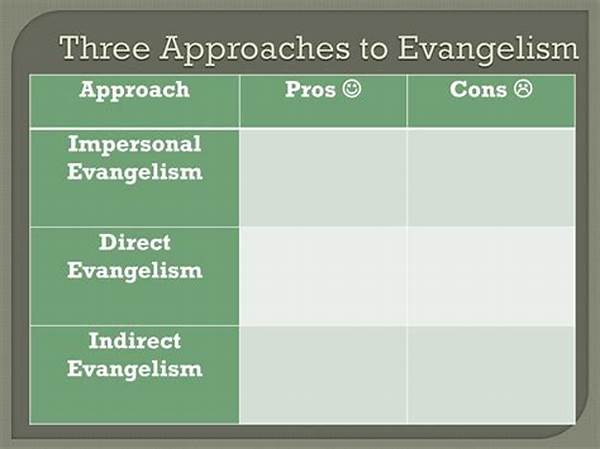Hello there! If you’ve stumbled across this, it’s probably because you’re curious about understanding fresh and novel ways to share spiritual truths in today’s fast-paced world. In a time where everyone is connected digitally, the traditional approaches to evangelism could do with a dash of creativity and transformation. Let’s dive into some engaging methods that are making waves in the spiritual community.
Understanding Transformative Approaches to Spiritual Evangelism
Imagine weaving everyday experiences with spiritual insights to engage listeners. That’s what transformative approaches to spiritual evangelism aim to achieve. They aren’t about standing on a soapbox, preaching at people. Instead, they create connections through relatable stories and real-world applications of spiritual principles. These approaches are about meeting people where they are and speaking into the realities of their lives.
Picture this: you’re at a coffee shop, sharing stories with a friend, and seamlessly, the conversation shifts to faith and spirituality. There’s two-way dialogue, mutual respect, and genuine interest. That’s transformative evangelism! It leverages an understanding of popular culture, the challenges faced by the modern world, and the timeless truths of spirituality to inspire people and provoke thought without ever being overbearing. It’s about authentic relationships and sparked curiosity. So, let’s rethink how to engage people in a more impactful way.
Key Concepts of Transformative Approaches
1. Relational Engagement: Transformative approaches to spiritual evangelism focus on building authentic relationships rather than one-time interactions.
2. Cultural Relevance: They incorporate current events and cultural phenomena to make spiritual discussions relatable.
3. Storytelling: Using narratives and personal experiences creates an inviting space for spiritual dialogue.
4. Active Listening: Prioritizing listening over speaking allows for deeper connections.
5. Empathy and Understanding: Approaching evangelism with empathy ensures messages resonate on a personal level.
Practical Applications of Transformative Approaches
Building connections through transformative approaches to spiritual evangelism is incredibly rewarding. Let’s take a closer look at how this plays out in real life. Imagine you’re in a community setting—maybe it’s a neighborhood dinner, a local book club, or volunteering at a charity event. These aren’t traditionally religious settings, but they offer a tapestry of lives intertwined through shared experiences.
You initiate conversations that naturally drift towards topics like hope, purpose, and love. Instead of delivering a sermon, you share stories—perhaps about personal growth or moments where spirituality has brought peace amid chaos. These transformative approaches make spirituality tangible, relatable, and resonant. It’s not about having all the answers; it’s about journeying together, questioning, exploring, and learning. The beauty of this approach is in its flexibility and adaptability to various situations, making it easier to share spiritual beliefs in meaningful and impactful ways.
Benefits of Transformative Approaches
The beauty of transformative approaches to spiritual evangelism lies in their power to deeply affect lives. Here’s why they work:
1. Enhanced Connection: By focusing on relationships, we deepen the connection with others, allowing spiritual conversations to flow naturally.
2. Personal Growth: These approaches encourage personal and spiritual growth, not just for those being evangelized but also for the evangelists themselves.
3. Broader Reach: Transformative methods can tap into various cultural settings, reaching a more diverse audience.
4. Authenticity: Real, unforced encounters mean people feel valued and heard, fostering authentic spiritual discussions.
5. Sustainability: Creating ongoing dialogues instead of short-term encounters ensures lasting impact.
6. Empowerment: People feel empowered when they see their stories reflected in spiritual narratives.
7. Accessibility: Making spirituality accessible to those who may not consider themselves religious is a huge advantage.
8. Mutual Respect: Conversations rooted in respect lead to genuine exploration of beliefs.
9. Increased Engagement: Participants are more likely to engage deeply when they feel spiritually nourished.
10. Flexibility: These approaches can be adapted to suit different contexts and individual needs, making them effective across various landscapes.
The Future of Evangelism
Looking ahead, transformative approaches to spiritual evangelism hold immense potential for the future. As society becomes more interconnected yet individualistic, the need for personalized, empathetic, and dynamic evangelism grows. The future might see even more integration of technology, storytelling, and art in evangelistic efforts, reaching hearts and minds in innovative ways.
Imagine spiritual retreats that incorporate virtual reality to immerse participants in biblical stories, or podcasts that seamlessly blend spiritual discussions with trending cultural topics. These are not far-fetched ideas but rather exciting possibilities within reach. The goal is to bring spirituality closer to daily life, breaking down barriers of misunderstanding and disinterest.
Lastly, at the core of transformative approaches to spiritual evangelism is love—unconditional, unwavering love that transcends boundaries, prejudices, and differences. By championing a message of love and understanding, we create communities that thrive on acceptance and shared values, paving the way for a spiritually enriched world.
Challenges and Opportunities
With every new idea comes both challenges and opportunities. Transformative approaches to spiritual evangelism are no exception. As we try to reach out with empathy and relevance, we might encounter resistance or misunderstanding. However, these challenges are opportunities in disguise.
For instance, navigating cultural sensitivities requires patience and adaptability, traits that strengthen the message of love and unity inherent in spiritual beliefs. Additionally, as we embrace new mediums and methods, there’s room for creativity. Whether it’s through music, social media, or interactive workshops, the avenues for sharing the transformative power of spirituality are endless.
In summary, transformative approaches to spiritual evangelism are about more than mere words; they are about actions, lifestyle, and being a living testament to the faith one holds dear. They offer a beacon of hope in a constantly changing world, reminding us that while the methods might evolve, the message of love and connection remains timeless and enduring.
